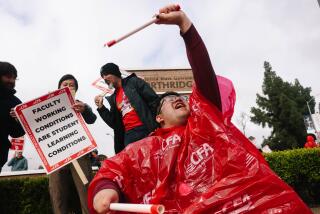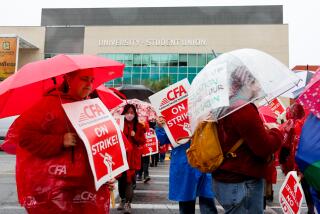Post-Labor Day Start at Community Colleges Is Passed Over Protests
Over opposition from students and faculty, San Diego Community College District trustees have switched to a post-Labor Day start for the next school year in an attempt to halt years of declining enrollment.
Wednesday night’s unanimous vote (Trustee Richard Johnston was absent) moves the start of the 1987-88 school year to Sept. 14 and aligns it with the San Diego Unified School District’s calendar.
College district researchers have said that aligning the community college calendar with the city schools calendar will allow parents of young children to attend college while their children are in school. The average district student last year was 30 years old, and 43% of the students had children under 18.
San Diego State University students, who are sometimes shut out of classes because of overcrowding, also will have time to switch to the community colleges under the new calendar, researchers believe.
Chancellor Garland Peed expects the move to attract 2,400 to 4,200 more students to the district, which enrolled about 35,000 this year.
“We had some very good research and some evidence that if we began our calendar at the same time the K-12 district does, we could generate more students. Right now, that’s the name of the game,” Trustee Eugene French said.
Enrollment has dropped sharply at City, Mesa and Miramar colleges since all three moved to the August starting date five years ago. District officials acknowledge that other factors--such as the imposition of a $50 tuition in 1984--have also suppressed enrollment.
But enrollment gains at other community colleges that have shifted to the late-start calendar lead them to believe that a similar measure here will help stop the slide. For example, the Los Angeles Community College District reversed a five-year, 33% enrollment decline with a calendar change, heavy advertising and expansion of remedial courses.
City and Mesa colleges began this school year Aug. 18, but in an experiment, Miramar started later, and enrollment increased.
Meanwhile, after the first week of the 1987 spring semester, City College has registered a 9.6% enrollment increase compared to last year, district spokesman Barry Garron said Thursday.
Enrollment at the district’s downtown campus is at 9,604, up from 8,760 last spring. The increase is apparently due to a $121,000 marketing campaign begun last fall by City College officials, which consisted of mailing 175,000 schedules to prospective students, distributing 4,000 posters to downtown companies, and other measures.
Student leaders Thursday resented that their petitions against the new calendar, given to trustees in recent weeks, had no effect.
“We’re really upset,” said Greg Brown, vice president of the Associated Students, the elected student government. “We feel like what they’re saying to us is ‘We don’t care what students think, we don’t care what the faculty thinks, we’re going to do this anyway,’ ”
Student opposition was sparked by the new exam schedule. Students now will take first-semester finals about two weeks after they return from Christmas vacation, instead of before the vacation as they do now. Many students said that studying for exams will dampen the holiday spirit, Brown said.
Under the new calendar, the Christmas vacation will be shortened to 10 days from more than four weeks weeks.
There will be a mid-semester break from Jan. 25 to Jan. 30, and the second semester will begin Feb. 1. It will end June 10, nine days later than this year.
As a compromise, Brown presented a petition signed by several hundred students Wednesday night asking the trustees to begin the new calendar Sept. 8. The appeal was denied.
Many faculty members believe that little is accomplished during the weeks between the end of Christmas vacation and the beginning of finals, said Fred Horn, president of the teachers union.
“The period after vacation on the late start calendar is primarily a wasted period of time,” he said. “We felt that, academically, the student was far better off to finish the semester before the winter break.”
But Horn said that the teachers are less vehemently opposed to the switch than students.
The district will need the approval of the state’s community colleges governing board because the new calendar shaves four days from the required 175 yearly instructional days, said Lee Brown, the district’s coordinator of student services. On those four days, faculty will take training seminars and advise students who are registering for classes, he said.
More to Read
Sign up for Essential California
The most important California stories and recommendations in your inbox every morning.
You may occasionally receive promotional content from the Los Angeles Times.










